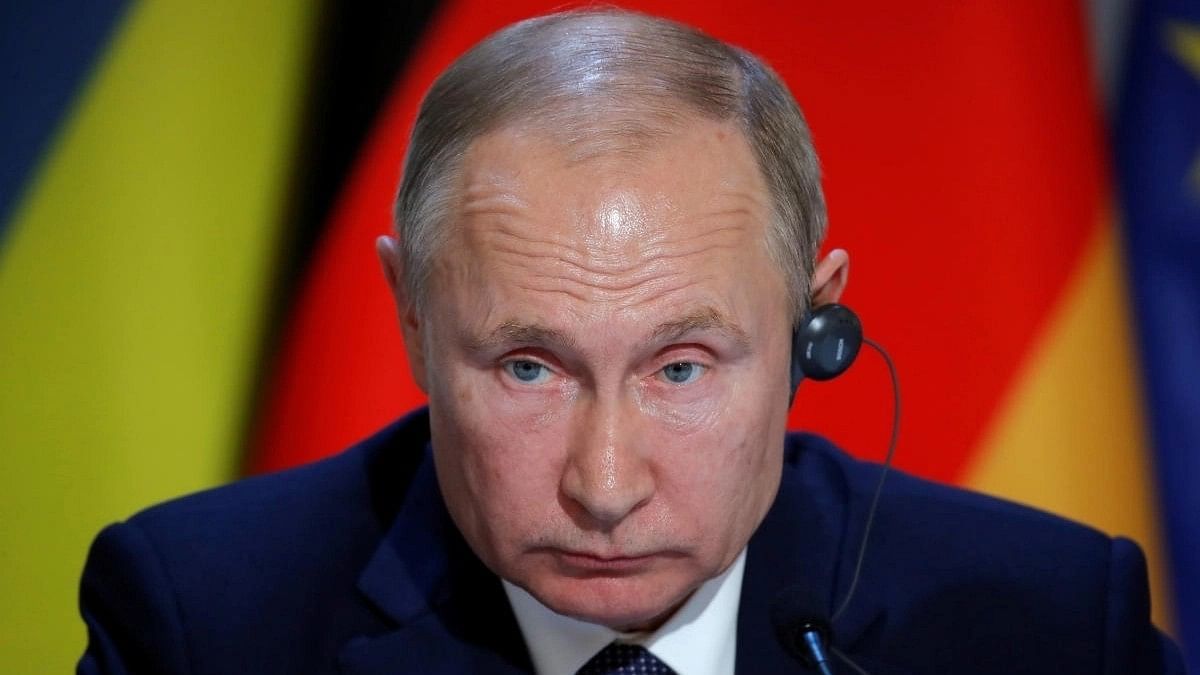
Russia's President Vladimir Putin.
Credit: Reuters file photo
By Bloomberg News
Russian President Vladimir Putin dismissed warnings of a terrorist threat days before the deadliest attack in Moscow in more than two decades killed over 100 people.
Putin hasn’t appeared or commented in public so far after the assault by gunmen with automatic weapons late Friday against people attending a rock concert at the Crocus City Hall on the edge of the capital. Fire ripped through the massive venue after explosions were heard during the attack, leading to a partial collapse of the roof.
SITE, an organisation which tracks jihadist channels, said Islamic State had claimed the attack in a Telegram post. Bloomberg was not immediately able to confirm the claim. A manhunt was underway for the suspects, who escaped by car, the RIA Novosti state news agency reported.
Russia’s Investigative Committee said Saturday the death toll may increase, the Interfax news service reported. It’s the biggest single loss of life from terrorism in Moscow since Chechen separatists took hostages in 2002 at the Nord-Ost theater, where at least 170 people including the dozens of attackers died during a botched rescue mission.
On Tuesday at a meeting with senior Federal Security Service officers, Putin hit out at “frankly, provocative statements” by Western officials earlier this month warning of a possible imminent terrorist attack in the city. “All this resembles outright blackmail and the intention to intimidate and destabilize our society,” the president told Russia’s main internal security service, known as the FSB.
The US Embassy in Moscow had issued a public warning on March 7 that “extremists have imminent plans to target large gatherings in Moscow, to include concerts.”
While the US didn’t say specifically that the warning was related to the attack, National Security Council spokesperson Adrienne Watson said in a statement late Friday that “the US government had information about a planned terrorist attack in Moscow.”
“The US government also shared this information with Russian authorities in accordance with its longstanding ‘duty to warn’ policy,” she added.
The assault took place just days after Putin cemented his grip on Russia by claiming a fifth term with 87 per cent of the vote in the presidential election. He was monitoring developments closely, the Kremlin said Friday. Authorities canceled public events and tightened security in cities across the country.
The FSB said earlier this month it prevented an attack on a Moscow synagogue by what it called an Afghan branch of Islamic State, Interfax reported.
The bloody assault on the capital was a throwback to an earlier period of Putin’s quarter-century rule, when suicide bombings, most blamed on Islamists from within Russia or its neighbors, killed scores. It shattered the illusion of security in Moscow that Putin has sought to cultivate in the more than two years since he invaded Ukraine.
Islamist groups have targeted Russia in the past citing what they call anti-Muslim policies by the Kremlin. The seizure of a school in Beslan in the south of the country led to more than 380 fatalities in 2004. In 2010, twin suicide attacks in Moscow subway stations killed at least 40, while a suicide bombing killed 16, including the attacker, in the St. Petersburg subway in 2017.
President Joe Biden was being updated on the events Friday, according to the White House. There was no indication of Ukrainian involvement, spokesman John Kirby said.
Some Russian state-media commentators suggested Kyiv may be to blame, but Ukraine denied any role, calling it a false-flag operation by the Kremlin.
“The US Embassy warning in early March indicates we had intelligence on some sort of planning,” said Thad Troy, a former Central Intelligence Agency Russia specialist who served in Moscow. “I doubt it’s a false-flag. Putin is secure and doesn’t need to do that.”
Moscow Insulated
Moscow has been largely insulated from the direct effects of Putin’s February 2022 invasion of Ukraine, which his spokesman Dmitry Peskov called “a state of war” for the first time on Friday. He later walked back the comments.
“The obvious route for the Kremlin to spin this is that it’s something to do with the war in Ukraine,” said Charles Lichfield, deputy director of the Atlantic Council’s GeoEconomics Center in Washington. “The immediate response could be more drone attacks and ballistic attacks, but they already increased before the terrorist attacks.”
Moscow’s forces have stepped up missile strikes against Ukrainian cities and infrastructure in recent weeks, killing dozens of civilians. Early Friday, it unleashed the biggest missile and drone assault on Ukraine so far this year.
At the same time, Ukraine has mounted a campaign of strikes inside Russia with its troops struggling on the battlefield amid delays in vital aid from the US and other allies. Drones have hit factories and oil refineries, while attackers in border regions have staged raids.